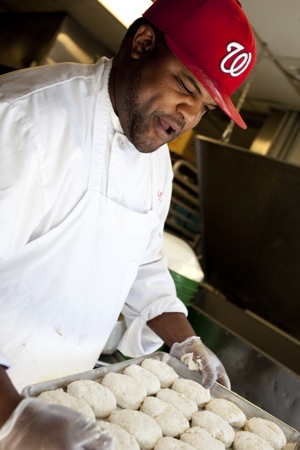Food for the Soul at New Orleans Institution
By Spencer Selvidge
On almost any of the winding streets in New Orleans you can find Creole cooking. From a hole-in-the-wall po’ boy shop in Slidell to the fine dining of Emeril’s and Brennan’s in the French Quarter, the city is the center of the Creole gourmand’s universe.
Mother’s Restaurant, on Poydras Street next to the French Quarter, has pulled off a rare feat: It is both a local institution and a tourist magnet. Inside you can find what owner and manager Jerry C. Amato calls New Orleans home-style cooking: Creole favorites mixed with “your grandmother’s kitchen.” That combination brings up to 2,000 people through the doors during the week, Amato says, and plenty more on a busy weekend.
Mother’s customers are everyday regulars, business travelers and occasional international tourists. National Guardsmen and recovery workers were the restaurant’s main patrons for months after reopening post-Katrina.
Now, though, arriving customers usually wait in line outside unless they want lunch at 9:45 a.m. There simply isn’t room to wait inside. Once in the door, Amato greets them with “Take a menu out of the box, stand in line, order at the counter and take a seat.”
Stacie Robinson, a Mother’s waitress for eight years, gleefully asks “How you doing, baby?” while the smell of jambalaya, red beans, fresh bread and pounds and pounds of fried seafood fills the air. The clamor of dishes, cooking, conversation and people shuffling in and out continues 15 hours a day.
The down-home joint might not seem like a seat of social justice or change. But Mother’s serves more than comfort food: It has served to comfort a community, and in its way it has helped to heal a wounded New Orleans. The restaurant is a twinkling economic light in an otherwise dim economy.
 The word in the kitchen is that Amato pays his workers well in comparison with many other restaurants. It plays heavily into the success of the business, which was established in 1938.
The word in the kitchen is that Amato pays his workers well in comparison with many other restaurants. It plays heavily into the success of the business, which was established in 1938.
Amato’s family is the second to own the restaurant, since 1986, but Mother’s has a long history as a “TUN tavern,” meaning a U.S. Marine Corps bar. Since World War II Mother’s has been a haven for traveling and retired Marines.
The walls are covered with images of patrons, servicemen, employees and prominent city players throughout the restaurant’s history, many of whom the staff including Amato and his business partner Joe Balderas, see more as family.
Whether the present success of Mother’s can be attributed to Amato’s business or social sensibilities or just sheer luck, its long-term health and success spring from the atmosphere Mother’s has created and maintained for generations, one of inclusiveness, fairness and family.
Amato says New Orleans is economically buoyant. “I couldn’t understand why people weren’t coming back until I saw the rest of the city,” he said. “And I mean it [was] destroyed.”
After the shock of the aftermath of Hurricane Katrina, though, Amato decided to redouble his efforts to reopen as quickly as possible. Amato’s own house was not badly damaged, but he soon realized many of his most important employees would face severe challenges in the months after the storm.
Amato had private trailers placed in his parking lot to house senior staff. That way, the restaurant could reopen sooner than others nearby. If employees weren’t worried about a roof over their families’ heads, Amato figured, business could get rolling again. “But that was our recession,” he said. “It’s just been a great two years. All we could do was go up after the hurricane … that’s the difference.
“The last two years have been really good because the festival business has been so good, the weekends have been so good. So that’s been real good for us, and people [are] going on shorter vacations. Instead of traveling 1,000 miles, they’re traveling 100 miles; it’s a perfect place. So summers have been good, it’s just — we’ve been okay. But recession-proof? Never. It just depends on how crazy things get.”